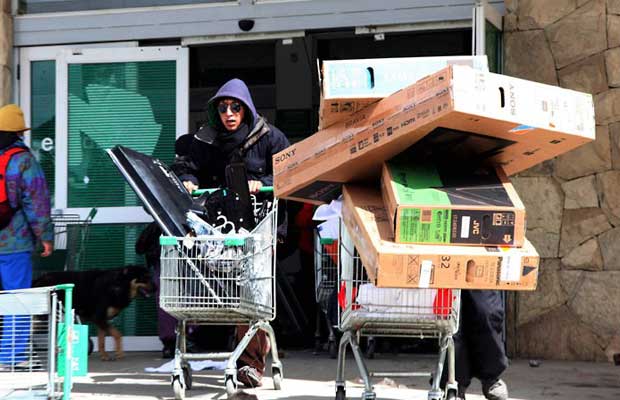
Have you ever stolen anything? Chances are that most of us have at least one time in our lives. This could range from the completely innocent act of taking something you thought was yours by mistake, like your buddy’s Metallica CD, to something more heinous like the outright theft of a wad of cash laying on the table. Most of us, I would assume, haven’t done anything like the latter and even if we did, could probably chalk a good bit of this up to youthful indiscretions that you may or may not have already paid retribution for. I would imagine that few if any of us have even thought of smashing a window in or kicking down a door, entering someone’s home and taking anything. I would expect that even fewer of us have busted a store window down, barged inside and reemerged with a flat screen TV or handfuls of new clothes ripped from the rack. They are arguably the same thing though and that is stealing. Whether it’s your friend’s money or the TV from the store in town, if you take something that isn’t yours it is theft, right?
Is there ever a time when it is ok to steal? Maybe you say, we aren’t stealing we are scavenging and that is perfectly fine. Under the right circumstances and in the right situation I would agree with you. So today I wanted to discuss looting vs scavenging and how the two are related and how in a survival situation you could go about scavenging for items that could save your life.
When is it OK to Loot?
For many of us, just about any recent examples of disasters, protests, sports riots or uprisings in various forms illustrate a certain amount of looting. During Hurricane Katrina, looters floated garbage cans filled with clothing and jewelry down the streets. Even before Hurricane Sandy made landfall, people were tweeting their plans to loot the stores. There are usually people in the media or experts who want to explain away this type of behavior and remove any responsibility from the people perpetuating these crimes and associate guilt to societal breakdown. They insist that these people should be held blameless for their actions because of the disaster and the horrible effects it must be having on their lives. I think that in the overwhelming majority of cases that is crap and people who are looting by and large are simply criminals that should be punished. For me, looting is wrong and I can easily make the distinction between looting and scavenging. It comes down to a few basic questions for me.
What are you taking? – The looters in both Katrina and Sandy that I mentioned above weren’t taking items to keep them alive; they were plundering stores to enrich themselves. A flat screen TV is not something you need and could never be reasonably excused as necessary for your life. Jewelry? Clothing could on some very small-scale be construed as needed for survival in the right circumstances, but not if you already have a house full of clothing.
Why are you taking it? – The looter takes what they can get, not what they need. You may argue that these people were poor and they needed those TV’s, that clothing and that jewelry to make their lives better. Maybe they were going to sell those goods for money (not sure to whom) or that they needed those goods as reparations for some injustice 200 years ago. Even more absurd, you could say they needed the clothing to be able to get a better job. Right…
Who are you taking it from? – If you are taking almost anything from an electronics store, jewelry, liquor, or clothing, you are looting. This is what we routinely see on the news and these aren’t people who are scratching to survive, they are just stealing because there are no police around or worse, the police aren’t doing anything to stop them. Bottom line is these people are thieves and in a true grid down emergency, I wouldn’t be surprised if they didn’t pay for those TV’s with their lives.
In those three examples above, there is no right way to steal. You don’t need anything you are stealing and your life is not in peril if the supplies you are taking aren’t acquired. You are simply looting because you can.
What makes scavenging any better than looting?
Scavenging on the other hand is what you see in almost every dystopic portrayal of a disaster or future where the world has gone to hell in a hand basket and people are eating dog food. If you watch any type of survival/apocalypse movie, the main characters will invariably find some supplies in a department store or abandoned house, maybe in a car somewhere. In the last Walking Dead, two characters found supplies of food in a house they came across. In the movie the Road, they actually found a survival bunker full of food. Food is very definitely something you need to live. I point to movies and TV shows because most of us have never lived through a situation where we had to steal food to live because there simply was no place left to get food anymore. These movies and TV shows are the only example of a future that some of us can imagine in extreme cases. Extreme poverty in third world countries is not what I am talking about here.
Imagining a total collapse of society, not a regional storm; certainly not a soccer game riot, where the supply lines and means of support we have relied on for years are completely ripped out; I can see us all facing a future where scavenging might be required if you expect to live. If we had a zombie apocalypse (I know there is no such thing as zombies…yet), nuclear war, global pandemic or a massively disruptive event that wiped out a lot of people in a relatively short period of time you could find yourself scavenging for items you need to stay alive. I can guarantee if something that horrible happened you wouldn’t be going after the big screen TV’s anymore. You would be looking for food, maybe even a dry place to sleep, anything that could keep you alive or safe. The problem is, so would anyone else who was alive.
Scavenging for food seems very logical under extreme conditions. What if you are wearing boots that are worn or even worse, footwear that isn’t appropriate to walking every day? Would you go looking for new shoes? Would you look for a good pack to carry everything, assuming you didn’t already have a good bug out bag? Scavenging is at its most basic searching for items to keep you alive or that could help you. Scavenging is not looting a brand new TV because you want to watch the game when the power comes back on.
Scavenging is not something I plan to do if people are around or there is the reasonable expectation that whatever event I am going through will be short-lived and that is one of my reasons to prepare. I don’t expect to be effected by short-term emergencies. I would go into abandoned homes or businesses in extreme conditions if I was fairly certain that the owners were dead or could reasonably assume they would not be coming back. If this was my own area, I would start as far away from my home as possible and work my way backward towards my home. To keep track of the homes I had been in, I would try to have a map. This would prevent me from going into the same houses twice. If I was sheltering in place I would be looking for supplies I didn’t have or ones that could augment the supplies I do have like extra food, medical items, ammunition or items that can be used defensively. How is this different from looting if I already have supplies you ask? In my hypothetical, everyone is gone or dead and I am collecting what would rot to keep me and my group alive. I am not running into a store for a TV because the water rose (temporarily) or the power was out (temporarily).
If you need to scavenge, you have to realize that isn’t act isn’t without risk either. This must be balanced with the risk you face going into these homes, leaving your own and how much the home or neighborhood has already been scavenged by other people. Scavenging for food to save my family’s life is a risk I am willing to take under the right conditions. Getting some new sneakers or a flat screen TV is not.




















